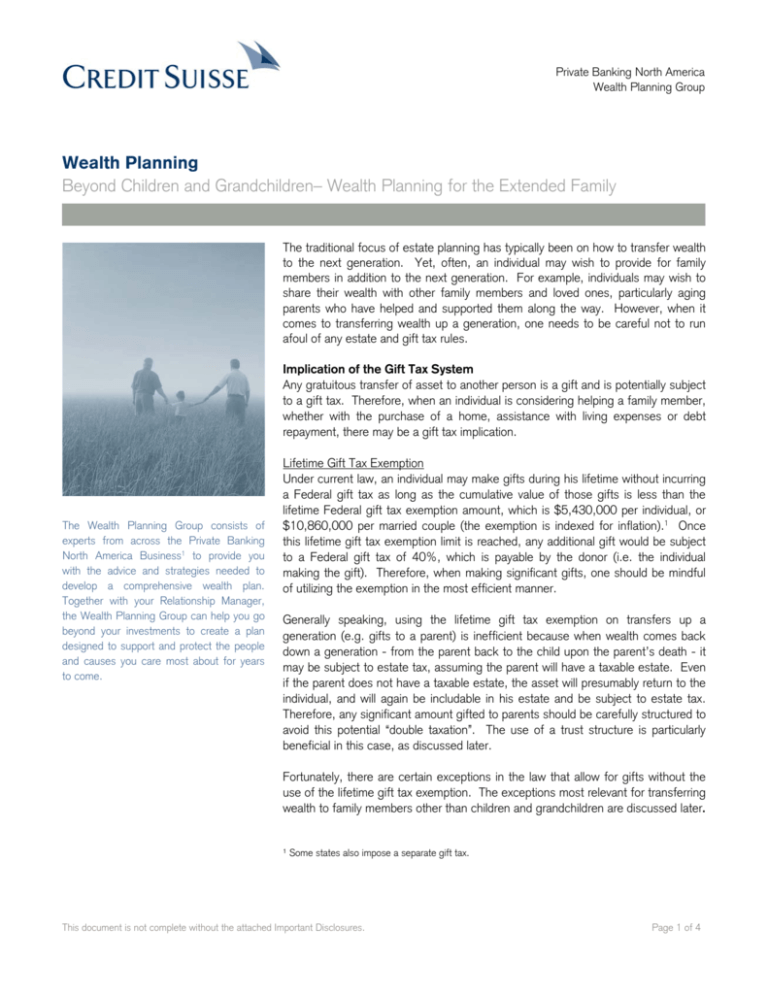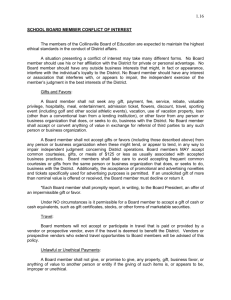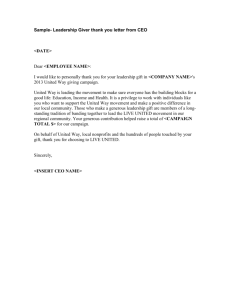
Private Banking North America
Wealth Planning Group
Wealth Planning
Beyond Children and Grandchildren– Wealth Planning for the Extended Family
The traditional focus of estate planning has typically been on how to transfer wealth
to the next generation. Yet, often, an individual may wish to provide for family
members in addition to the next generation. For example, individuals may wish to
share their wealth with other family members and loved ones, particularly aging
parents who have helped and supported them along the way. However, when it
comes to transferring wealth up a generation, one needs to be careful not to run
afoul of any estate and gift tax rules.
Implication of the Gift Tax System
Any gratuitous transfer of asset to another person is a gift and is potentially subject
to a gift tax. Therefore, when an individual is considering helping a family member,
whether with the purchase of a home, assistance with living expenses or debt
repayment, there may be a gift tax implication.
The Wealth Planning Group consists of
experts from across the Private Banking
North America Business1 to provide you
with the advice and strategies needed to
develop a comprehensive wealth plan.
Together with your Relationship Manager,
the Wealth Planning Group can help you go
beyond your investments to create a plan
designed to support and protect the people
and causes you care most about for years
to come.
Lifetime Gift Tax Exemption
Under current law, an individual may make gifts during his lifetime without incurring
a Federal gift tax as long as the cumulative value of those gifts is less than the
lifetime Federal gift tax exemption amount, which is $5,430,000 per individual, or
$10,860,000 per married couple (the exemption is indexed for inflation).1 Once
this lifetime gift tax exemption limit is reached, any additional gift would be subject
to a Federal gift tax of 40%, which is payable by the donor (i.e. the individual
making the gift). Therefore, when making significant gifts, one should be mindful
of utilizing the exemption in the most efficient manner.
Generally speaking, using the lifetime gift tax exemption on transfers up a
generation (e.g. gifts to a parent) is inefficient because when wealth comes back
down a generation - from the parent back to the child upon the parent’s death - it
may be subject to estate tax, assuming the parent will have a taxable estate. Even
if the parent does not have a taxable estate, the asset will presumably return to the
individual, and will again be includable in his estate and be subject to estate tax.
Therefore, any significant amount gifted to parents should be carefully structured to
avoid this potential “double taxation”. The use of a trust structure is particularly
beneficial in this case, as discussed later.
Fortunately, there are certain exceptions in the law that allow for gifts without the
use of the lifetime gift tax exemption. The exceptions most relevant for transferring
wealth to family members other than children and grandchildren are discussed later.
¹ Some states also impose a separate gift tax.
This document is not complete without the attached Important Disclosures.
Page 1 of 4
Private Banking North America
Wealth Planning Group
Annual Gifting
Each year, an individual may gift an amount equal to the
annual gift tax exclusion to any individual. In 2015, the
annual gift tax exclusion is $14,000. There is no restriction
on the identity or number of recipients. For example, if one
wishes to help five individuals (mother, father, uncle, niece,
and friend), one could make a $14,000 gift to each of these
people, resulting in a total gift of $70,000. This $70,000 gift
would not reduce the $5,430,000 lifetime gift tax exemption.
If the individual is married, such individual and his spouse may
gift double the annual gift tax exclusion amount (i.e.
$28,000) to each gift recipient. It is important to note that
this is an annual allowance so that if the individual fails to
make this gift in any calendar year, the individual will not get
the benefit of the unused annual gift tax exclusion the
following year. Therefore, it is important to maximize this
gifting opportunity by utilizing the annual gift tax exclusion
every year.
Some popular strategies to maximize the use of the annual
gift tax exclusion include the following: creating a trust for
the benefit of a family member and funding the trust with the
annual exclusion amount each year; funding a 529 education
savings plan for the future education needs of a family
member; and purchasing life insurance in an irrevocable life
insurance trust to benefit family in case of one’s premature
death.
Gifts for Medical and Education Expenses
Any payments made on behalf of someone else for certain
medical and education expenses are also exempt from the
gift tax if the payments are made directly to the medical or
educational institution. For example, if an elderly parent has
hospital bills, one would want to pay those bills directly to the
hospital, as opposed to giving cash to a parent (thus a gift)
and having the parent use that cash to pay the hospital. As
family members, especially elderly parents, often have
medical expenses, this is a very efficient way to assist family
without any gift tax consequences. Likewise, education
expenses should be paid directly to the education institution
to take advantage of this gift tax exception. Using this
strategy, the individual may satisfy the education and medical
needs of a family member while preserving the lifetime gift
tax exemption and the annual gift tax exclusion for other
uses.
Using a Trust Structure for Significant Gifts
When it comes to gifts of significant monetary value, a trust
structure offers many advantages. A properly structured trust
This document is not complete without the attached Important Disclosures.
could provide benefits in terms of tax efficiency, management
over the assets and creditor protection. From a tax efficiency
perspective, one may avoid the potential “double taxation”
discussed earlier by using a trust structure. An individual
could create a trust for the benefit of his parents and gift
assets into the trust. The gift would not be taxable as the
individual would utilize his lifetime gift tax exemption on the
transfer. During the lifetime of the parents, the trustee may
distribute the income and principal of the trust to the parents
or use the trust assets for their benefit. Upon the parents’
death, to the extent that any assets remain in the trust, the
assets could continue in trust for the benefit of the
individual’s children and/or other family members. The trust
assets would not be includable in the parent’s or the
individual’s estate. For additional flexibility, one may also add
other beneficiaries to the trust (e.g., adding the individual’s
spouse as a discretionary beneficiary which would allow the
spouse to benefit from the trust assets if the need arises).
Upon the creation of the trust, the individual may also provide
specific instructions for the management of the trust assets.
Often times, the individual may not wish for the beneficiaries
to have control of the funds, and would rather appoint
another individual, or even a professional corporate trustee, to
manage the assets on behalf of the beneficiaries.
Furthermore, the trust agreement could contain specific
terms controlling the access and use of the trust assets. For
example, an individual may create a trust that directs the
trustee to manage and utilize the trust assets for the family’s
education needs. Another example could be a trust that
owns a home and the terms of the trust direct the trustee to
allow the parents to live in that home for as long as they wish,
and then upon their deaths, the home could be sold and the
cash proceeds from the sale would remain in trust for the
remainder beneficiaries, such as the individual’s children.
Lastly, a properly structured and administered trust may
protect the trust assets from the beneficiaries’ creditors.
Intrafamily Loans
A loan to a family member may also be an effective way to
provide assistance to a loved one while preserving the use of
the lifetime gift tax exemption for the next generation. For
example, an individual may lend money to a family member
and charge the minimum interest rate required based on the
appropriate applicable federal rate (“AFR”), which varies
depending on the length of the loan and the month the loan is
given. As long as the interest rate charged is at or above the
applicable AFR, then no gift has been made. This strategy is
particularly timely because of the current low interest rate
environment. For example, a five-year loan placed in January
2015 would need to have a minimum interest rate of 1.75%.
Page 2 of 4
Private Banking North America
Wealth Planning Group
With the borrowed funds, the family member can use the
cash for his needs, or perhaps even to repay an existing debt
with a higher interest rate. Alternatively, the family member
could use the borrowed funds to invest in other assets that
may have a higher return than the interest he is paying on the
loan, thus shifting the appreciation on the underlying assets
from the individual to the family member without the use of
the lifetime gift tax exemption.
It is important to note that the parties should document the
loan properly with a promissory note and ensure that the loan
is administered properly. Actual repayment of the loan is
important as any debt forgiveness would be considered a gift.
However, an individual may utilize the annual gifting strategy
discussed earlier by forgiving the annual interest for up to the
This document is not complete without the attached Important Disclosures.
annual gift tax exclusion amount (the forgiveness of the
annual interest due would be a gift that falls under the annual
gift tax exclusion).
Summary
High net worth individuals need to be aware of the estate and
gift tax rules to ensure that any gifts made are done in the
most tax efficient manner. Traditional wealth planning
concepts which aim to transfer wealth to a younger
generation may not always be in synch with the practical
needs of today’s world. With proper planning, an individual
can achieve the dual goals of providing for family members
and preserving the ability to transfer wealth efficiently to the
next generation.
Page 3 of 4
Private Banking North America
Wealth Planning Group
For More Information
Please contact your Credit Suisse Relationship Manager.
www.credit-suisse.com
Important Disclosures
This is provided to you by Credit Suisse Securities (USA) LLC (“CSSU”) for your information only. This is not intended to be
an offer or solicitation to purchase or sell any security or to employ a specific investment strategy. No part of this material may
be reproduced or retransmitted in any manner without the prior written permission of CSSU. CSSU does not represent,
warrant or guarantee that this material is accurate, complete or suitable for any purpose or any particular investor and it should
not be used as a basis for investment decisions. It is not to be relied upon or used in substitution for the exercise of
independent judgment. Information and opinions expressed by us have been obtained from sources believed to be reliable.
CSSU makes no representation as to their accuracy or completeness and CSSU accepts no liability for losses arising from the
use of the material presented.
This material does not contain all of the information that you may wish to consider and it does not take into account your
individual situation or circumstances. CSSU does not provide, and nothing contained herein should be construed as, tax,
accounting or legal advice; you should consult your personal accounting, tax, and legal advisors to understand the implications
of any investment specific to your personal financial situation.
The term "Credit Suisse" is the global marketing brand name for the investment banking, asset management and private
banking services offered by Credit Suisse Group subsidiaries and affiliates worldwide. Unless otherwise specified, the term
"Credit Suisse Private Banking" generally refers to the combined capabilities of Credit Suisse Group subsidiaries and affiliates
that provide private banking services to high net worth clients worldwide. The term “Private Banking North America” generally
refers to the private banking business within CSSU. Each legal entity in Credit Suisse Group is subject to distinct regulatory
requirements and certain products and services may not be available in all jurisdictions or to all client types. There is no
intention to offer products and services in countries or jurisdictions where such offer would be unlawful under the relevant
domestic law.
Private Banking North America is a business in CSSU. CSSU is a US registered broker dealer and investment adviser. CSSU
and the Private Banking North America business in CSSU each is not a chartered bank, trust company or depository
institution. It is not authorized to accept deposits or provide corporate trust services and it is not licensed or regulated by any
state or federal banking authority. References to the Private Banking North America business refer solely to the private
banking business in CSSU.
Internal Revenue Service Circular 230 Disclosure: As provided for in Treasury regulations, advice (if any) relating
to federal taxes that is contained in this communication (including attachments) is not intended or written to be
used, and cannot be used, for the purpose of (1) avoiding penalties under the Internal Revenue Code or (2)
promoting, marketing or recommending to another party any plan or arrangement addressed herein.
©2014 CREDIT SUISSE GROUP AG and/or its affiliates. All rights reserved.
This document is not complete without the attached Important Disclosures.
Page 4 of 4








